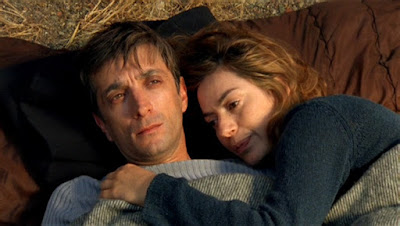A cold and stylised rapacity
Is it messed up to admit you understand why the characters in a book like Crash find their fetishes as hot as they do (even if it’s not exactly your fetish)? It’s a rhetorical question, and you don't need to answer it, but Ballard wanted us, I think, to know that he did, for he named the first-person narrator of Crash James Ballard. Ballard the protagonist, a producer of television adverts, is not Ballard the author. All they really have in common is a name, and those of you who have names you are attached to will understand what a powerful thing that is.
Friday 24 June 2022
The Question in Bodies #43: F*** the Future (iv)
Tuesday 21 June 2022
The Question in Bodies #42: F*** the Future (iii)
(A digression concerning low-flying aircraft)
In Ballard's story “Low-Flying Aircraft”, a couple, Forrester and Judith, travel north to Sweden to have a baby. While there, they see the odd behaviour of a local doctor, who flies back and forth across the landscape, spraying lines in silvery paint. The world’s population has plummeted, due to most babies being born apparently deformed. In fact, we find out, human fertility has skyrocketed, and the supposedly deformed children – although blind they can sense their environment and communicate in ways “able bodied” people cannot – are the next step in human evolution, delayed by a desperate desire for eugenic purity. “Mutant” children are routinely aborted the moment they are identified in the womb, or summarily killed when they are born. Except sometimes they aren’t.
Friday 17 June 2022
The Question in Bodies #41: F*** the Future (ii)
Welcoming them into the future
“Later, as he sat on his balcony eating the dog, Dr Robert Laing reflected on the unusual events that had taken place within his huge apartment building during the previous three months."
– Ballard, High-Rise, Chapter 1.
I’ve had a history, going back to my time in academia, of deconstructing first pages of fiction and let me tell you, as opening lines go, that's an absolute banger. First lines are programmatic things, carrying in them the full weight of the story to come, or, alternatively, sometimes acting as lies or traps. This opener does both in some really interesting ways. It introduces one of the (it turns out three) point of view characters. It suggests languor and thoughtfulness, and a character with time and space and the privilege to reflect (he’s a doctor, so you think he would). And also it suggests, in a single word, something that is, to the intended audience – literate, English-speaking – something terrible, some breakdown of the normal order of things, and more so because of what it suggests about the kind of man Laing is by the time it has happened, that he has the time to sit on a balcony and reflect on what happened here, but is still very much OK with eating someone’s pet.
Tuesday 14 June 2022
The Question in Bodies #40: F*** the Future (i)
The Sexual Counter-Revolution
I think that the general consensus is that we are now more or less resigned to the sexual revolution of the sixties and seventies having been subject to a lengthy and successful counter-revolution, with the result that society is right now less openly sexual than it has been for a long time. And certainly, while steps have been made since that time to support people with sexualities other than the hetero and genders other than the cis, the keys of power are working harder than ever to wind the clock backwards. A decade ago, many would have found it unthinkable that the UK would be listed alongside Turkey, Russia, Poland and Hungary as one of the worst places to be LGBTQ+ in the so-called developed world. The fact that in the USA there’s even a debate as to whether anti-gay conversion therapy should be outlawed is really quite a telling indicator of the way that the wind is blowing. For those of us who identify as queer, these are frightening times.
But while from the top of our societies down our identities and sexualities seem more at risk than ever, in the everyday traffic of our lives, it isn’t really like that. In fact, our passions have balkanised, divided into any number of communities, subcommunities and infracommunities, where we can talk about these things, where we can remain radicalised against the mainstream norms. We have whole samizdat spaces existing within the social media, entire languages. In a way this is how it's always been for most of history. The liberalisation of the media, and the bringing of us into the mainstream, was an enterprise of only a few decades. As media branched off and splintered, the multiplicities of human identity split off into entire phyla, leaving commodified, acceptable versions behind in the mainstream, husks of the human self, there for the hand of power to ram itself into and manipulate like a rainbow cavalcade of Muppets (and let's not even get to what happened to the actual Muppets). Multinational corporations – sociopathic and rapacious by definition – adding rainbow flags to their logos one month a year isn't actually progress.
The flip side of this, the good side of this, is that the communities on the new margins have networks that they never had before. It's easier than ever to find your tribe, no matter how esoteric its concerns might once have been. Our closets are conditional now, furnished with WiFi. We can functionally be different people in different spaces for good or ill.
When our sexualities have been balkanised, so have our selves.




